-
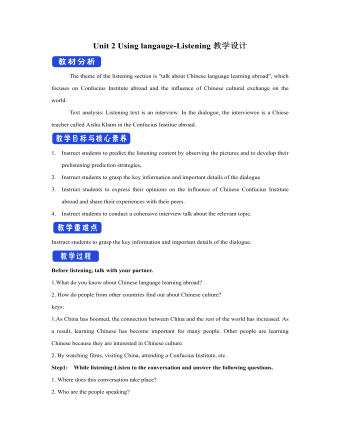
新人教版高中英语选修2Unit 2 Using langauge-Listening教学设计
? B: Absolutely! Getting involved with Chinese cultural activities there definitely helped a lot. I got to practice my Chinese on a daily basis, and I could learn how native Chinese speakers spoke.? A: What do you feel is your biggest achievement?? B: Learning Chinese characters! I have learnt about 1,500 so far. When I first started, I didn't think it was even going to be possible to learn so many, but now I find that I can read signs, menus, and even some easy newspaper articles.? A: What are you most keen on?? B: I've really become keen on learning more about the Chinese culture, in particular Chinese calligraphy. As I have learnt Chinese characters, I have developed a great appreciation for their meaning. I want to explore Chinese characters by learning how to write them in a more beautiful way. ? A: Finally, what do you want to say to anyone interested in learning Chinese?? I have really become keen on learning more about the Chinese culture, in particular Chinese Calligraphy. As I have learnt Chinese character, I have developed a great appreciation for their meaning. I want to explore Chinese characters by learning how to write them in a more beautiful way.? A: Finally, what do you want to say to anyone interested in learning Chinese?? B: I'd say, give it a shot! While some aspects may be difficult, it is quite rewarding and you will be happy that you tried.? A: Thanks for your time. ? B:You're welcome.
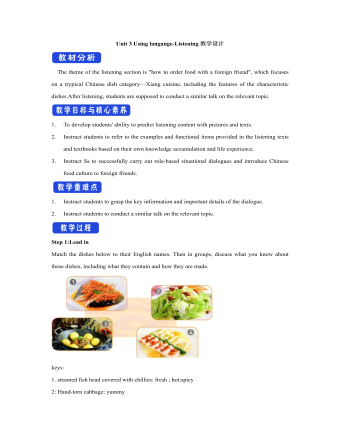
新人教版高中英语选修2Unit 3 Using langauge-Listening教学设计
1. How is Hunan cuisine somewhat different from Sichuan cuisine?The heat in Sichuan cuisine comes from chilies and Sichuan peppercorns. Human cuisine is often hotter and the heat comes from just chilies.2.What are the reasons why Hunan people like spicy food?Because they are a bold people. But many Chinese people think that hot food helps them overcome the effects of rainy or wet weather.3.Why do so many people love steamed fish head covered with chilies?People love it because the meat is quite tender and there are very few small bones.4.Why does Tingting recommend bridge tofu instead of dry pot duck with golden buns?Because bridge tofu has a lighter taste.5 .Why is red braised pork the most famous dish?Because Chairman Mao was from Hunan, and this was his favorite food.Step 5: Instruct students to make a short presentation to the class about your choice. Use the example and useful phrases below to help them.? In groups of three, discuss what types of restaurant you would like to take a foreign visitor to, and why. Then take turns role-playing taking your foreign guest to the restaurant you have chosen. One of you should act as the foreign guest, one as the Chinese host, and one as the waiter or waitress. You may start like this:? EXAMPLE? A: I really love spicy food, so what dish would you recommend?? B: I suggest Mapo tofu.? A: Really ? what's that?
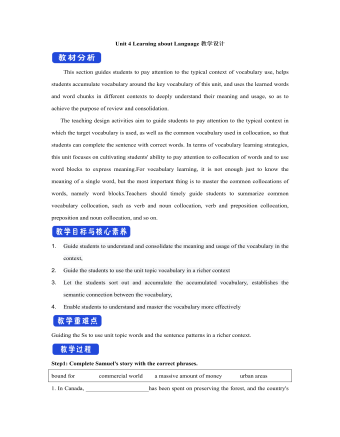
新人教版高中英语选修2Unit 4 Learning about Language教学设计
This section guides students to pay attention to the typical context of vocabulary use, helps students accumulate vocabulary around the key vocabulary of this unit, and uses the learned words and word chunks in different contexts to deeply understand their meaning and usage, so as to achieve the purpose of review and consolidation.The teaching design activities aim to guide students to pay attention to the typical context in which the target vocabulary is used, as well as the common vocabulary used in collocation, so that students can complete the sentence with correct words. In terms of vocabulary learning strategies, this unit focuses on cultivating students' ability to pay attention to collocation of words and to use word blocks to express meaning.For vocabulary learning, it is not enough just to know the meaning of a single word, but the most important thing is to master the common collocations of words, namely word blocks.Teachers should timely guide students to summarize common vocabulary collocation, such as verb and noun collocation, verb and preposition collocation, preposition and noun collocation, and so on.1. Guide students to understand and consolidate the meaning and usage of the vocabulary in the context, 2. Guide the students to use the unit topic vocabulary in a richer context3. Let the students sort out and accumulate the accumulated vocabulary, establishes the semantic connection between the vocabulary,4. Enable students to understand and master the vocabulary more effectivelyGuiding the Ss to use unit topic words and the sentence patterns in a richer context.
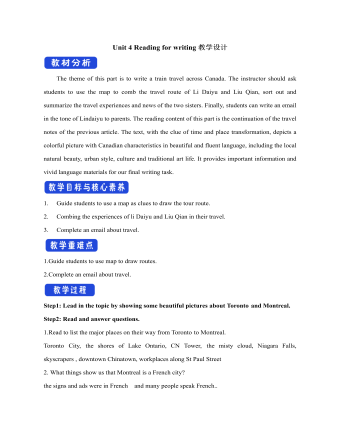
新人教版高中英语选修2Unit 4 Reading for writing教学设计
假定你是英国的Jack,打算来中国旅行,请你给你的中国笔友李华写一封信,要点如下:1.你的旅行计划:北京→泰山→杭州;2.征求建议并询问他是否愿意充当你的导游。注意:1.词数80左右(开头和结尾已给出,不计入总词数);2.可以适当增加细节,以使行文连贯。参考词汇:故宫 the Forbidden City;泰山 Mount TaiDear Li Hua,I'm glad to tell you that 'm going to visit China.First,I am planning to visit Beijing,the capitalof China,where I am looking forward to enjoying the Great Wall,the Forbidden City and somebeautiful parks.Then I intend to go to visit Mount Tai in Shandong Province.I've heard that it is one ofthe most famous mountains in China and I can't wait to enjoy the amazing sunrise there.After that,I amalso going to Hangzhou.It is said that it is a beautiful modern city with breathtaking natural sights,among which the West Lake is a well- known tourist attraction.What do you think of my travel plan? Will you act as my guide? Hope to hear from you soon.
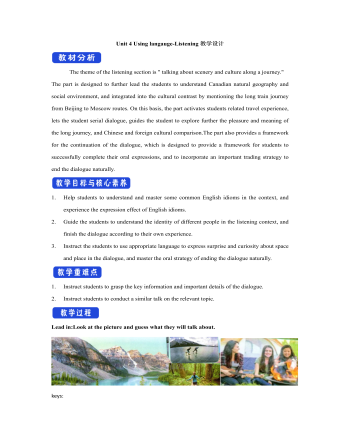
新人教版高中英语选修2Unit 4 Using langauge-Listening教学设计
The theme of the listening section is " talking about scenery and culture along a journey."The part is designed to further lead the students to understand Canadian natural geography and social environment, and integrated into the cultural contrast by mentioning the long train journey from Beijing to Moscow routes. On this basis, the part activates students related travel experience, lets the student serial dialogue, guides the student to explore further the pleasure and meaning of the long journey, and Chinese and foreign cultural comparison.The part also provides a framework for the continuation of the dialogue, which is designed to provide a framework for students to successfully complete their oral expressions, and to incorporate an important trading strategy to end the dialogue naturally.1. Help students to understand and master some common English idioms in the context, and experience the expression effect of English idioms.2. Guide the students to understand the identity of different people in the listening context, and finish the dialogue according to their own experience.3. Instruct the students to use appropriate language to express surprise and curiosity about space and place in the dialogue, and master the oral strategy of ending the dialogue naturally.1. Instruct students to grasp the key information and important details of the dialogue.2. Instruct students to conduct a similar talk on the relevant topic.
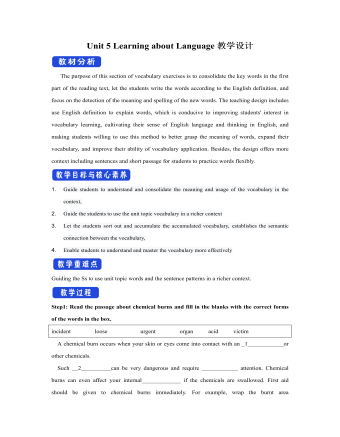
新人教版高中英语选修2Unit 5 Learning about Language教学设计
The purpose of this section of vocabulary exercises is to consolidate the key words in the first part of the reading text, let the students write the words according to the English definition, and focus on the detection of the meaning and spelling of the new words. The teaching design includes use English definition to explain words, which is conducive to improving students' interest in vocabulary learning, cultivating their sense of English language and thinking in English, and making students willing to use this method to better grasp the meaning of words, expand their vocabulary, and improve their ability of vocabulary application. Besides, the design offers more context including sentences and short passage for students to practice words flexibly.1. Guide students to understand and consolidate the meaning and usage of the vocabulary in the context, 2. Guide the students to use the unit topic vocabulary in a richer context3. Let the students sort out and accumulate the accumulated vocabulary, establishes the semantic connection between the vocabulary,4. Enable students to understand and master the vocabulary more effectivelyGuiding the Ss to use unit topic words and the sentence patterns in a richer context.Step1: Read the passage about chemical burns and fill in the blanks with the correct forms of the words in the box.
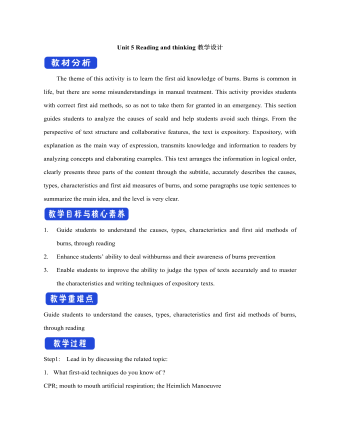
新人教版高中英语选修2Unit 5 Reading and thinking教学设计
The theme of this activity is to learn the first aid knowledge of burns. Burns is common in life, but there are some misunderstandings in manual treatment. This activity provides students with correct first aid methods, so as not to take them for granted in an emergency. This section guides students to analyze the causes of scald and help students avoid such things. From the perspective of text structure and collaborative features, the text is expository. Expository, with explanation as the main way of expression, transmits knowledge and information to readers by analyzing concepts and elaborating examples. This text arranges the information in logical order, clearly presents three parts of the content through the subtitle, accurately describes the causes, types, characteristics and first aid measures of burns, and some paragraphs use topic sentences to summarize the main idea, and the level is very clear.1. Guide students to understand the causes, types, characteristics and first aid methods of burns, through reading2. Enhance students’ ability to deal withburnss and their awareness of burns prevention3. Enable students to improve the ability to judge the types of texts accurately and to master the characteristics and writing techniques of expository texts.Guide students to understand the causes, types, characteristics and first aid methods of burns, through readingStep1: Lead in by discussing the related topic:1. What first-aid techniques do you know of ?CPR; mouth to mouth artificial respiration; the Heimlich Manoeuvre
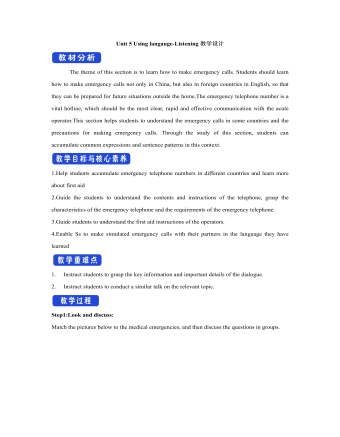
新人教版高中英语选修2Unit 5 Using langauge-Listening教学设计
The theme of this section is to learn how to make emergency calls. Students should learn how to make emergency calls not only in China, but also in foreign countries in English, so that they can be prepared for future situations outside the home.The emergency telephone number is a vital hotline, which should be the most clear, rapid and effective communication with the acute operator.This section helps students to understand the emergency calls in some countries and the precautions for making emergency calls. Through the study of this section, students can accumulate common expressions and sentence patterns in this context. 1.Help students accumulate emergency telephone numbers in different countries and learn more about first aid2.Guide the students to understand the contents and instructions of the telephone, grasp the characteristics of the emergency telephone and the requirements of the emergency telephone.3.Guide students to understand the first aid instructions of the operators.4.Enable Ss to make simulated emergency calls with their partners in the language they have learned1. Instruct students to grasp the key information and important details of the dialogue.2. Instruct students to conduct a similar talk on the relevant topic.Step1:Look and discuss:Match the pictures below to the medical emergencies, and then discuss the questions in groups.
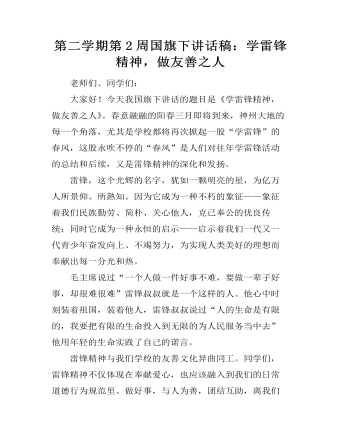
第二学期第2周国旗下讲话稿:学雷锋精神,做友善之人
老师们、同学们:大家好!今天我国旗下讲话的题目是《学雷锋精神,做友善之人》。春意融融的阳春三月即将到来,神州大地的每一个角落,尤其是学校都将再次掀起一股“学雷锋”的春风,这股永吹不停的“春风”是人们对往年学雷锋活动的总结和后续,又是雷锋精神的深化和发扬。雷锋,这个光辉的名字,犹如一颗明亮的星,为亿万人所景仰、所熟知。因为它成为一种不朽的象征——象征着我们民族勤劳、简朴、关心他人,克已奉公的优良传统;同时它成为一种永恒的启示——启示着我们一代又一代青少年奋发向上、不竭努力,为实现人类美好的理想而奉献出每一分光和热。毛主席说过“一个人做一件好事不难,要做一辈子好事,却很难很难”雷锋叔叔就是一个这样的人。他心中时刻装着祖国,装着他人,雷锋叔叔说过“人的生命是有限的,我要把有限的生命投入到无限的为人民服务当中去”他用年轻的生命实践了自己的诺言。
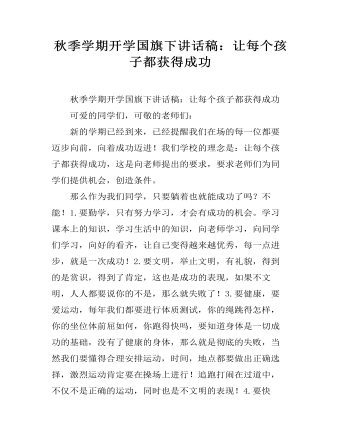
秋季学期开学国旗下讲话稿:让每个孩子都获得成功
秋季学期开学国旗下讲话稿:让每个孩子都获得成功可爱的同学们,可敬的老师们:新的学期已经到来,已经提醒我们在场的每一位都要迈步向前,向着成功迈进!我们学校的理念是:让每个孩子都获得成功,这是向老师提出的要求,要求老师们为同学们提供机会,创造条件。那么作为我们同学,只要躺着也就能成功了吗?不能!1.要勤学,只有努力学习,才会有成功的机会。学习课本上的知识,学习生活中的知识,向老师学习,向同学们学习,向好的看齐,让自己变得越来越优秀,每一点进步,就是一次成功!2.要文明,举止文明,有礼貌,得到的是赏识,得到了肯定,这也是成功的表现,如果不文明,人人都要说你的不是,那么就失败了!3.要健康,要爱运动,每年我们都要进行体质测试,你的绳跳得怎样,你的坐位体前屈如何,你跑得快吗,要知道身体是一切成功的基础
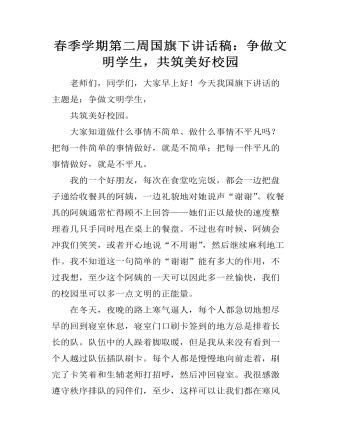
春季学期第二周国旗下讲话稿:争做文明学生,共筑美好校园
老师们,同学们,大家早上好!今天我国旗下讲话的主题是:争做文明学生,共筑美好校园。大家知道做什么事情不简单、做什么事情不平凡吗?把每一件简单的事情做好,就是不简单;把每一件平凡的事情做好,就是不平凡。我的一个好朋友,每次在食堂吃完饭,都会一边把盘子递给收餐具的阿姨,一边礼貌地对她说声“谢谢”。收餐具的阿姨通常忙得顾不上回答——她们正以最快的速度整理着几只手同时甩在桌上的餐盘。不过也有时候,阿姨会冲我们笑笑,或者开心地说“不用谢”,然后继续麻利地工作。我不知道这一句简单的“谢谢”能有多大的作用,不过我想,至少这个阿姨的一天可以因此多一丝愉快,我们的校园里可以多一点文明的正能量。
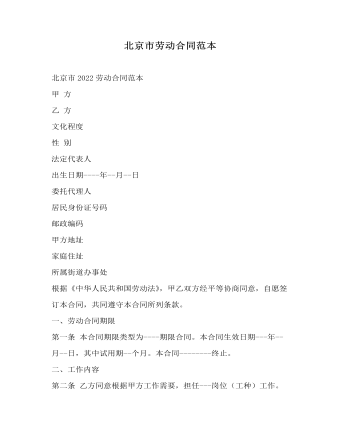
北京市劳动合同范本
第三十三条支付乙方经济补偿时,乙方在甲方工作时间不满一年的按一年的标准发给经济补偿金。第三十四条乙方患病或者非因工负伤,经劳动鉴定委员会确认不能从事原工作,也不能从事由甲方另行安排的工作而解除本合同的,甲方还应发给乙方不低于企业上年月人均工资六个月的医疗补助费,患重病和绝症的还应增加医疗补助费,患重病的增加部分不低于医疗补助费的百分之五十,患绝症的增加部分不低于医疗补助费的百分之一百。第三十五条甲方违反本合同约定的条件解除劳动合同或由于甲方原因订立的无效劳动合同,给乙方造成损害的,应按损失程度承担赔偿责任。第三十六条乙方违反本合同约定的条件解除劳动合同或违反本合同约定的保守商业秘密事项,对甲方造成经济损失的,应按损失的程度依法承担赔偿责任。
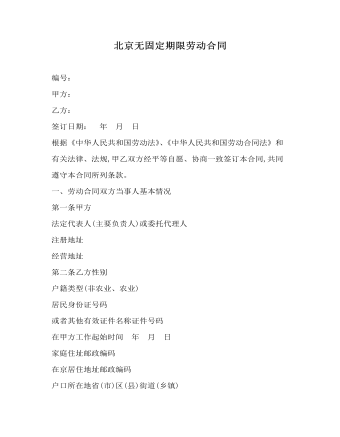
北京无固定期限劳动合同
七、劳动保护、劳动条件和职业危害防护第十五条甲方根据生产岗位的需要,按照国家有关劳动安全、卫生的规定为乙方配备必要的安全防护措施,发放必要的劳动保护用品。第十六条甲方根据国家有关法律、法规,建立安全生产制度;乙方应当严格遵守甲方的劳动安全制度,严禁违章作业,防止劳动过程中的事故,减少职业危害。第十七条甲方应当建立、健全职业病防治责任制度,加强对职业病防治的管理,提高职业病防治水平。八、劳动合同的解除、终止和经济补偿第十八条甲乙双方解除、终止劳动合同应当依照《中华人民共和国劳动合同法》和国家及北京市有关规定执行。第十九条甲方应当在解除或者终止本合同时,为乙方出具解除或者终止劳动合同的证明,并在十五日内为乙方办理档案和社会保险关系转移手续。
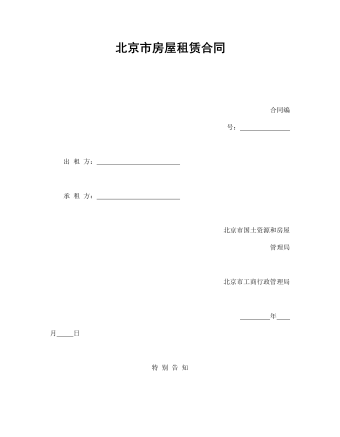
北京市房屋租赁合同
一、本合同为北京市国土资源和房屋管理局与北京市工商行政管理局共同制订的示范文本,供房屋租赁双方当事人约定使用,但不适用于执行政府规定租金标准的公有房屋的租赁关系。签订合同前,双方当事人应仔细阅读合同各项条款,未尽事宜可在第十八条“其他约定事项”或合同附件中予以明确。二、签订合同前,租赁双方应相互交验有关身份证明及房屋权属证明。三、接受他人委托代理出租房屋的,应在签订本合同前出示委托人开具的授权委托书或出租代理合同,向承租方明示代理权限。四、租赁双方应共同查验房屋内的设施、设备,填写《房屋附属设施、设备清单》并签字盖章。五、合同内的空格部分可由租赁双方根据实际情况约定填写。六、本合同签订之日起30日内租赁双方应按规定到房屋所在地的区县国土资源和房屋管理局或其委托的机构办理房屋租赁合同登记备案手续。
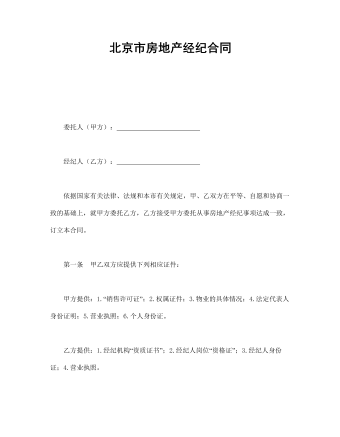
北京市房地产经纪合同
依据国家有关法律、法规和本市有关规定,甲、乙双方在平等、自愿和协商一致的基础上,就甲方委托乙方,乙方接受甲方委托从事房地产经纪事项达成一致,订立本合同。第一条 甲乙双方应提供下列相应证件:甲方提供:1.“销售许可证”;2.权属证件;3.物业的具体情况;4.法定代表人身份证明;5.营业执照;6.个人身份证。乙方提供:1.经纪机构“资质证书”;2.经纪人岗位“资格证”;3.经纪人身份证;4.营业执照。第二条 甲方委托乙方据实为其提供房地产经纪服务。共 项:1. 房地产经纪事项内容: 。2.具体要求: 。3.其他要求: 。第三条 甲、乙双方议定,在本合同履行期限内,甲方对其委托各房地产经纪事项,应在规定范围之内按下列比率向乙方支付服务费。委托代理房地产转让,按成交价的 %计算支付;
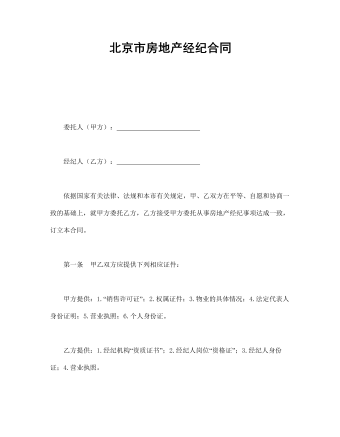
北京市房地产经纪合同
第四条 本合同履行期间,除甲方原因,乙方不能履行本合同第二条服务事项的,甲方不支付本合同第三条约定的各项服务费。乙方应将甲方已预付的服务费全部退还。乙方不能完全履行服务项目,则相应减少甲方应支付的服务费。具体数额甲、乙双方在补充条款中另行约定。本合同生效后,在合同履行期间甲方未经乙方同意,中途毁约,甲方已支付给乙方的服务费不予退还。未支付给乙方服务费,乙方有权按双方约定服务费的标准,向甲方追索。第五条 本合同履行期间,甲、乙任何一方需变更本合同的,要求变更一方应及时书面通知对方,征得对方同意后,双方在规定的时限内(书面通知发出_天内)签订变更协议,否则,由此造成对方的经济损失,由责任方承担。第六条 本合同履行期间,乙方应定期将本合同第二条为甲方服务的各房地产经纪事项情况及时通告甲方,甲方对乙方的履约应提供必要的帮助。并有权随时进行查询、督促。乙方将本合同第二条为甲方服务的各房地产经纪事项转委托其他房地产经纪人的,必须事先征得甲方的书面同意,由此而增加的费用和法律责任,由乙方承担。第七条 甲、乙双方商定,乙方有下列情况之一的,甲方有权按本合同第十三条约定,追偿因乙方过失造成的经济损失:1.未经甲方书面同意,擅自改变为甲方服务的各房地产经纪事项内容、要求和标准的;2.未经甲方书面同意,转委托他人代理的;3.违反国家和本市有关法律、法规、违背诚实信用原则,或与他人恶意串通,损害当事人利益的;4. 。第八条 甲、乙双方商定,甲方有下列情况之一的,乙方有权按本合同第十三条约定,追偿因甲方过失所造成的经济损失:1.要求乙方服务的房地产经纪事项不明确,或提供的有关证件和资料不实;2.甲方利用乙方提供的信息、条件、机会,擅自不履行合同;3.违反本合同第三条及补充条款的约定,不按期给付或拒付服务费的;4. 。第九条 甲、乙双方商定,乙方履行本合同第二条各房地产经纪事项的服务,必须自本合同生效之日起至 年 月 日止。除甲乙双方另有约定同意延期外,逾期视作本合同自行终止。在本合同终止后的__日内,如果委托人直接或间接地与经纪人最初物色的客户成交,那么经纪人有权获得经纪合同中订立的佣金。第十条 本合同履行期间,甲、乙双方因履行本合同而签署的补充协议及其它书面的文件,均为本合同不可分割的部分,具有同等法律效力。第十一条 本合同及补充条款中未约定的事项,应遵循我国有关法律、法规和本市规定执行。
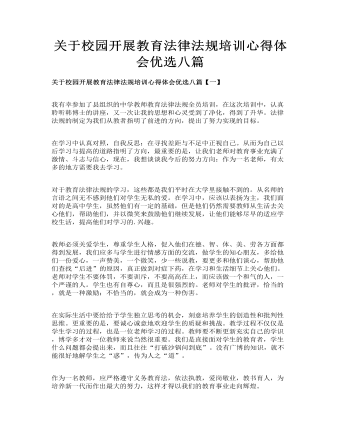
关于校园开展教育法律法规培训心得体会优选八篇
教师必须关爱学生,尊重学生人格,促入他们在德、智、体、美、劳各方面都得到发展,我们应多与学生进行情感方面的交流,做学生的知心朋友,多给他们一份爱心,一声赞美,一个微笑,少一些说教,要更多和他们谈心,帮助他们查找“后进”的原因,真正做到对症下药,在学习和生活细节上关心他们。老师对学生不要体罚,不要训斥,不要高高在上,而应该做一个和气的人,一个严谨的人。学生也有自尊心,而且是很强烈的。老师对学生的批评,恰当的,就是一种激励;不恰当的,就会成为一种伤害。
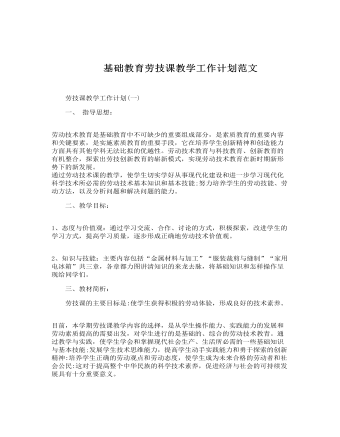
基础教育劳技课教学工作计划范文
1、态度与价值观:通过学习交流、合作、讨论的方式,积极探索,改进学生的学习方式,提高学习质量,逐步形成正确地劳动技术价值观。 2、知识与技能:主要内容包括“金属材料与加工”“服装裁剪与缝制”“家用电冰箱”共三章,各章都力图讲清知识的来龙去脉,将基础知识和怎样操作呈现给同学们。
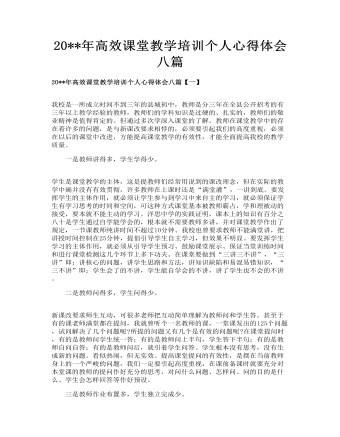
高效课堂教学培训个人心得体会八篇
一是教师讲得多,学生学得少。 学生是课堂教学的主体,这是提教师们经常用说到的课改理念,但在实际的教学中确并没有有效贯彻,许多教师在上课时还是“满堂灌”,一讲到底。要发挥学生的主体作用,就必须让学生参与到学习中来自主的学习,就必须保证学生有学习思考的时间和空间,可这种方式课堂基本被教师霸占,学和理被动的接受,要本就不能主动的学习。洋思中学的实践证明,课本上的知识有百分之八十是学生通过自学能学会的,根本就不需要教师多讲,并对课堂教学作出了规定,一节课教师纯讲时间不超过10分钟。我校也曾要求教师不能满堂讲,把讲授时间控制在25分钟,提倡引导学生自主学习,但效果不明显。要发挥学生学习的主体作用,就必须从引导学生预习、鼓励课堂展示、保证当堂训练时间和进行课堂检测这几个环节上多下功夫。在课堂要做到“三讲三不讲”,“三讲”即:讲核心的问题,讲学生思路和方法,讲知识缺陷和易混易错知识,“三不讲”即:学生会了的不讲,学生能自学会的不讲,讲了学生也不会的不讲。
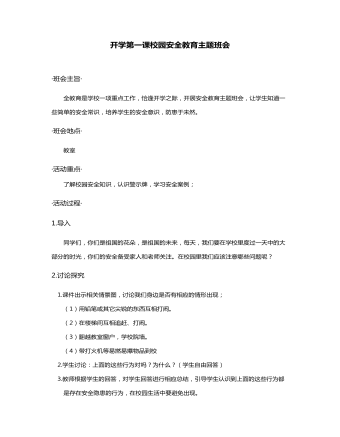
开学第一课安全教育主题班会教案
教师出示相关校园安全知识。(1)食品安全a. 不到没有卫生许可证的小摊贩处购买食品,选择新鲜和安全的食物;注意查看食品的保质期限、配方等安全信息。b. 养成良好的卫生习惯,饭前洗手。 c. 彻底洗净蔬果;不吃霉变的食物;不吃生食;尽量不吃剩菜剩饭。d. 保持健康的饮食习惯,不把饮料当水喝,不吃烧烤、油炸、烟熏及膨化食品,注意三餐定时定量。(2)人身安全 a.有序进出教室,上下楼梯靠右行,不拥挤或互相推搡。 b.在校园追跑打闹。不爬学校的围墙,门窗、围栏、树木、球架。 c.课外活动和体育锻炼,要按有关安全规则进行。在往返家校的路上,要注意交通安全,行路要严格遵守交通规则。 d.不得携带管制刀具,违禁物品进校园。(3)消防安全 a.不携带易燃、易爆、有毒物品等进入校园。 b.若插座、照明灯、电风扇等电器发生故障,不得私自动手排除,应报告教师或总务处,由学校电工进行故障排除。